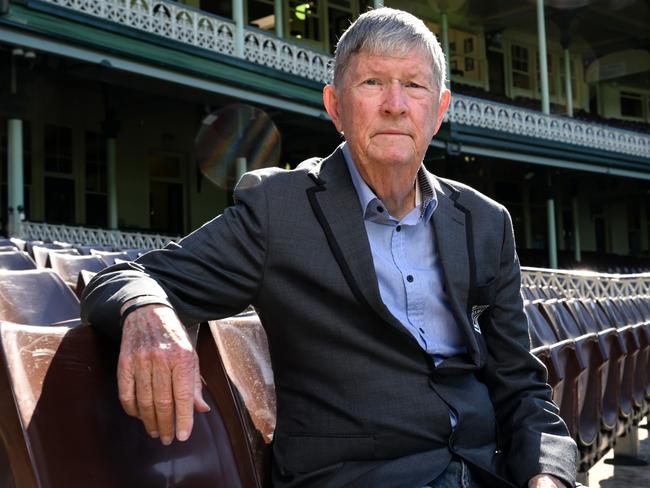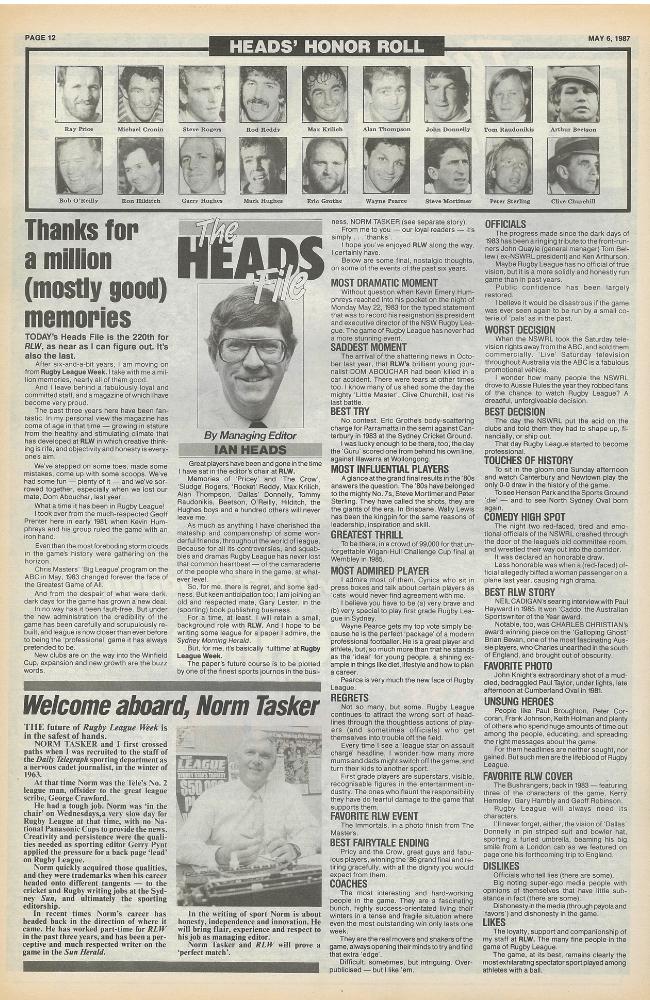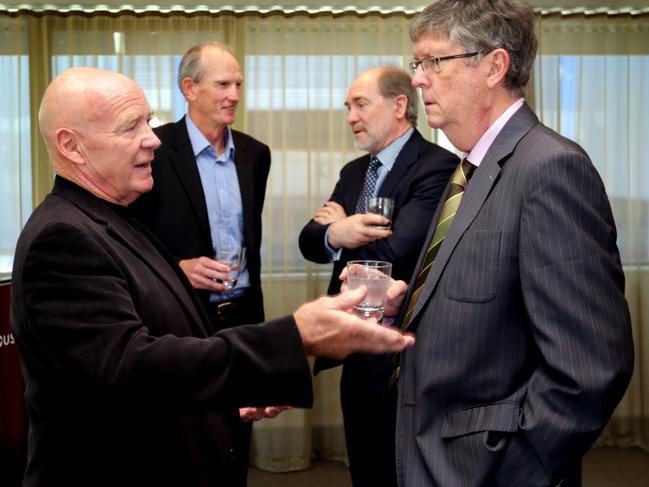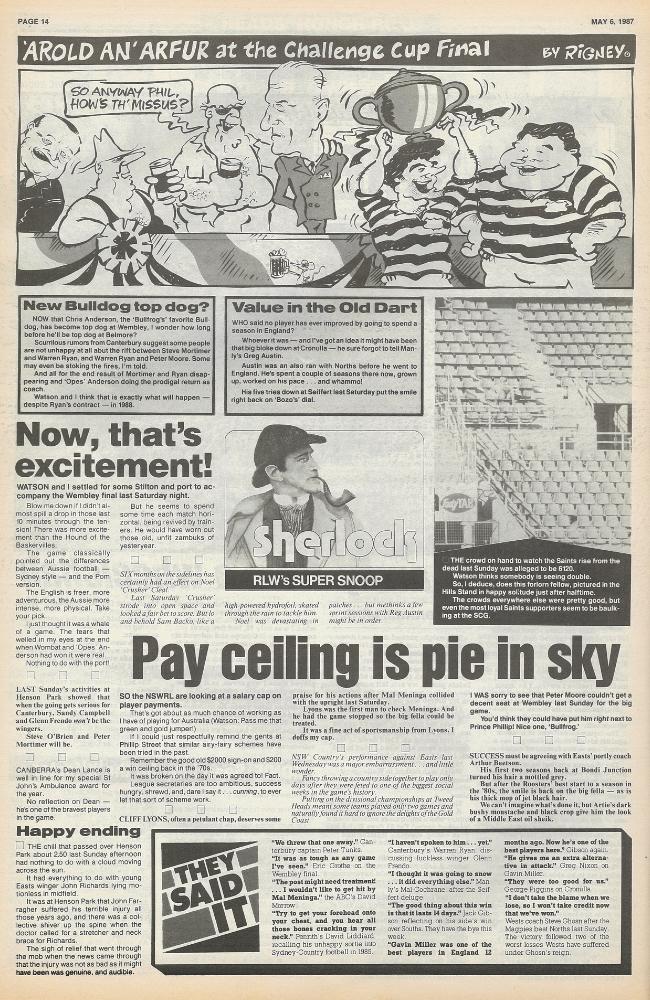How Ian Heads pulled off rugby league’s ultimate ‘secret’
As tributes continue to flow for the late Ian Heads, PAUL KENT reveals how the legendary sports journalist managed to deceive some of rugby league’s most ardent detectives.
NRL
Don't miss out on the headlines from NRL. Followed categories will be added to My News.
For many years Ian Heads, who died Monday at 81 after a long illness, held one of rugby league’s tightest secrets with a strong grip.
It came when Heads was managing editor at Rugby League Week in between stints at all the Sydney newspapers, when he was somewhere in the midst of writing some of the more than 40 books he wrote and somehow finding time for family and life around that.
The magazine was always published under the steam of its editors.
Under its first editor Geoff Prenter the magazine’s tone was that of a wild party, raucous and a hell of a lot of fun.
Heads took over in 1981 and took the magazine in a different direction, a move in line with his personality. It was classy and understated but still retained much of its irreverence.
In his final column before leaving the magazine, May 6, 1987, Heads informed readers he was leaving and filled his column, The Heads File, with his favourite memories of events and people from his time as boss.

Not mentioned among the highlights was the signing of the anonymous gossip columnist “Sherlock”, who tidied up all those loose ends that still exist in rugby league in a column was about the most fun you could read in rugby league at the time.
If it happened, it was there.
Sherlock was rugby league’s first snoop journalist. His kicker was a confessional “RLW’s Super Snoop”.
Sherlock’s column upset many back in the time and more than a few irritated coaches and club secretaries, as they were known then, sent out small search parties to ascertain who the rogue journo was and try to find a way to fix him.
Sherlock had none of the nastiness that surfaces in some gossip columns today but it had an edge and an insight into the game that convinced everybody that, whoever it was, they sure did know what was happening in and around the game.
Sherlock’s identity never got out.

Heads was managing editor and refused to release his identity even to his own staff. All anybody knew was that the words would land on his desk sometime before the presses began to roll and would be there when the magazine was on the news stands by Wednesday.
I asked him about one day and he told me he lost count the amount of times players and officials would corner him and vent their anger at a Sherlock column and plead for his identity so they could have a little talk.
We were friends despite being polar opposites in many ways.
The debt to Headsy is held by many, including here.
My first year writing league I worked alongside Alan Clarkson, another revered journalist from a previous generation, who retired after that season to be replaced by Heads.
The difference between the two, as a young reporter working behind them, was stark.
Heads could not have been more generous, more supportive or more helpful.

He would call with ideas for a story, a number for an interview, praise for a feature he particularly liked.
He was gentle and guiding and gave respect and, such was the man, he got it back by the shovelful.
He was a tremendous help to me and I was always thankful for that.
This was the early 1990s, so by then he had already done his stint at RLW.
On Heads’ last day as managing editor that day in 1987 his column announced his farewell and ran through his catalogue of moments, listing his most admired player (Wayne Pearce), the best RLW story (Neil Cadigan’s interview with Paul Hayward in 1985), best try (Eric Grothe’s five tackle bust epic against Canterbury), most dramatic moment (Kevin Humphreys’ resignation as NSWRL president amid corruption allegations) and best fairytale ending (Ray Price and Mick Cronin’s grand final farewell) among others.
Two pages later Sherlock revealed the NSW Rugby League, which ran the game back then, was considering a new innovation.

“So the NSWRL are looking at a salary cap on player payments,” he wrote.
“That’s got about as much chance of working as I have of playing for Australia …
“League secretaries are too ambitious, success hungry, shrewd, and, dare I say it … cunning, to ever let that sort of scheme work.”
Clearly he was a man ahead of his time.
Almost 40 years later he is still to be proven wrong, the salary cap alive and well but entirely at the mercy of cunning club officials. Old Sherlock had a wisdom to him born from knowing the game.
Over time, anybody that was around the game long enough came to learn Sherlock’s identity and, like the surprise ending to a good thriller, the identity was both a surprise and yet one that also made complete sense.
Sherlock, of course, was Heads.
Originally published as How Ian Heads pulled off rugby league’s ultimate ‘secret’




